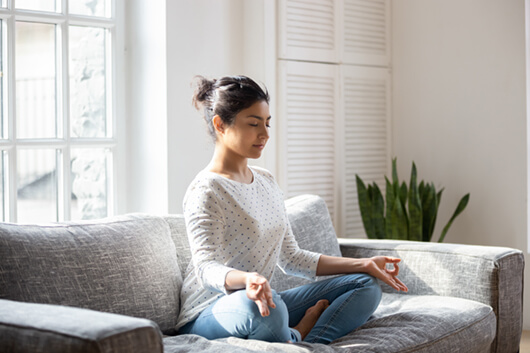
Surely there has never been a time in history when anxiety levels have been so high. Every way you turn it seems there is yet another reason to be stressed out over this or that latest news story. Anxiety can cause so much distress that it could possibly threaten sobriety. For someone in recovery, managing anxiety, as well as other mood disorders like depression or bipolar disorder, is imperative. Learn about the effective coping techniques that can help you reduce stress and anxiety while protecting your recovery.
About Anxiety and Depression
The two most common mental health challenges among American adults are anxiety disorder and depression. In fact, in many cases a substance use disorder began as an unfortunate result of self-medicating the symptoms of anxiety or depression with drugs or alcohol. The substance provided some temporary relief from the mental health issue, until it, too, became a problem. Get to know the signs and symptoms of anxiety and depression:
Types of Anxiety Disorders
Anxiety disorders affect over 40 million people in the U.S. Within the spectrum of anxiety disorders there are several types of anxiety:
- Generalized Anxiety Disorder
- Panic Disorder
- Specific Phobia
- Obsessive-Compulsive Disorder
- Social Anxiety
- Post-Traumatic Stress Disorder
Symptoms of Anxiety
Each of these different types of anxiety has its own unique set of features. There are some universal anxiety symptoms that are present among all the types, including:
- Feelings of fear or dread
- Shortness of breath
- Irritability
- Racing heart
- Sweating
- Sleep disturbances
Types of Depression
Approximately 17.2 million Americans struggle with a depressive disorder in any given year. Depression also takes different forms:
- Major Depressive Disorder
- Seasonal Affective Disorder
- Premenstrual Dysphoric Disorder
- Postpartum Depression
Signs of Depression
As with anxiety disorder, the different types of depression have specific characteristics, however some of the common depression symptoms include:
- Persistent feelings of sadness or hopelessness
- Fatigue
- Changes in eating habits, weight gain or loss
- Changes in sleeping habits, insomnia or hypersomnia
- Feelings of guilt or shame
- Difficulty concentrating or making decisions
- Loss of interest in activities usually enjoyed
- Thoughts of death or suicide
How to Cope with Anxiety
When anxiety ramps up and begins to affect your quality of life or threaten your recovery it is important to take some steps to manage the stress. Consider these helpful tips for managing anxiety:
- Try Focused Breathing. Deep breathing techniques help lower heart rate and blood pressure, bringing about a sense of calm within moments.
- Listen to Music. Surround yourself with soothing music when you sense stress levels rising. Music can immediately shift your mood and induce relaxation.
- Adopt a Pet. Many studies have shown that the calming effects of pet ownership offer a multitude of health benefits, including improved mental health.
- Use Mindfulness. Mindfulness helps train the mind to shift focus from stressful and distracting thoughts toward the sensations experienced in the present moment.
- Express Yourself. Reduce stress by picking up a paintbrush, redecorating a room, making jewelry or crafts, or blogging. Creative endeavors are very relaxing.
- Take a brisk walk. The simple act of taking a daily walk can have immense benefits, including stress reduction. This is due to physical activity producing serotonin and dopamine, which also improve sleep quality.
- Adjust Your Diet. Add foods rich in omega-3 fatty acids to help reduce stress. In addition, reduce sugars, caffeinated beverages, and processed foods for better emotion regulation.
- Try Guided Meditation. Using smartphone apps, take a little vacation in your mind through guided meditation scripts. Follow the prompts using mental imagery and enjoy a state of peaceful calm.
- Get a Massage. Release muscle tension and toxins through therapeutic massage. Enhance the relaxation massage with hot rocks and aromatherapy.
- Practice Yoga. Yoga combines specific poses and purposeful breathing that culminates in a meditative and relaxed state of being. Practicing yoga can help reduce stress while lowering both blood pressure and heart rate.
Read more: 6 Ways to Use Yoga in Recovery
Keeping anxiety and other mood disorders at bay in recovery is critical in preventing relapse. Be ever aware of your emotional state and take action when symptoms of anxiety arise. Integrate these coping skills into your daily or weekly routine to achieve optimal mental health during recovery.
Ashley Addiction Treatment, formerly Father Martin’s Ashley, is a nationally recognized nonprofit leader in integrated, evidence-based treatment for substance use disorders and is accredited by The Joint Commission. We offer both inpatient and outpatient programs, holistic addiction treatment, drug detox, relapse prevention plans, family wellness programs and a variety of other services tailored to each patient’s needs. Our driving principle — “everything for recovery” — reinforces our mission to heal each individual with respect and dignity, and reflects on our ongoing commitment to meet new challenges. For information about our comprehensive programs, please call (866) 313-6307.
